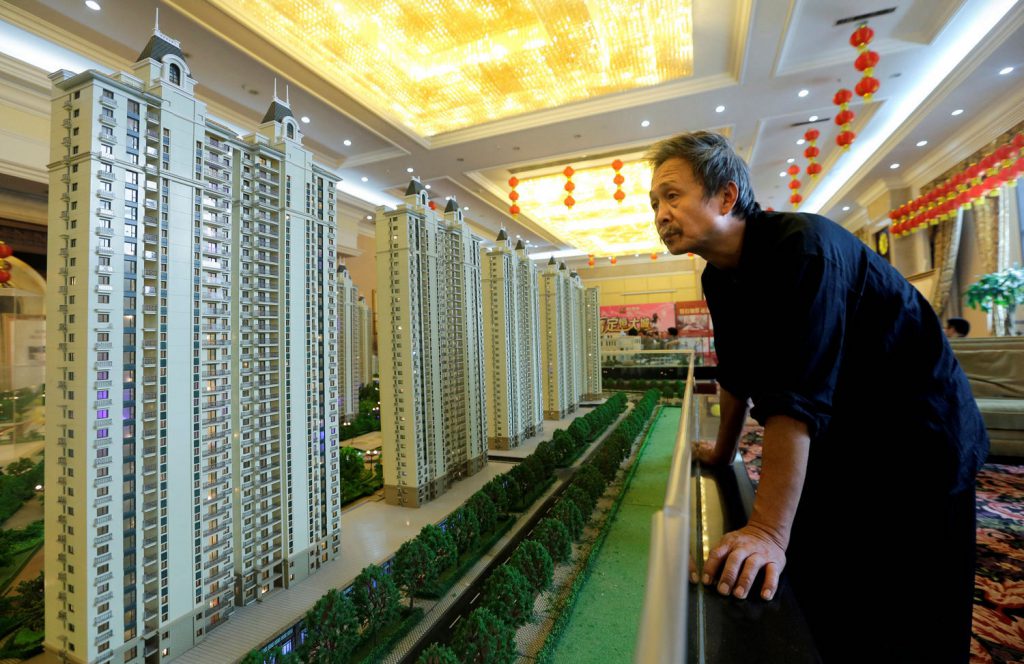China’s housing authority warned major banks on Wednesday that Evergrande Group will not be able to pay loan interest due on September 20. The news, reported by Bloomberg, underlines the threat of a broadening impact from the developer’s liquidity crisis.
Officials from the Ministry of Housing and Urban-Rural Development met with banks this week, the report said, citing sources familiar with the matter. It said Evergrande was still discussing the possibility of extending payments and rolling over some loans.
Analysts say Evergrande – the country’s second biggest developer – is teetering between a messy meltdown with far-reaching impacts, a managed collapse or the less likely prospect of a bailout by Beijing.
While the company is scrambling to raise funds to pay its many lenders and suppliers, regulators have warned of broader risks to the country’s financial system if Evergrande’s $305 billion of liabilities aren’t contained.
Evergrande on Tuesday said it has engaged advisers to examine its financial options and warned of cross-default risks amid plunging property sales and lack of progress in asset disposals. Housing ministry officials and Evergrande spokespeople have yet to respond to requests for comment.
The latest news comes as no surprise. Financial intelligence provider REDD reported last week that Evergrande had told two banks it planned to suspend interest payment due later this month.
But numerous sectors of the Chinese economy could be exposed to higher credit risks if property developer Evergrande defaults on some of its debts, according to Fitch Ratings.
“We believe a default would reinforce credit polarisation among homebuilders and could result in headwinds for some smaller banks, although we believe the overall impact on the banking sector would be manageable,” Fitch said in a statement on Wednesday.
Fitch downgraded China Evergrande Group to ‘CC’ from ‘CCC+’ on September 7, when it said a default of some kind was probable.
It said mounting investor concern about Evergrande’s financial state has already exacerbated credit polarisation among developers, notably “those with weaker credit metrics struggling to tap debt markets at sustainable interest rates, increasing refinancing risk.”
While Evergrande has projects in dozens of cities, the residential property market is highly fragmented and Evergrande’s share in 2020 was only around 4%, the agency said. So, it believes “the risk of significant pressure on house prices in the event of a default would be low, unless the restructuring or liquidation of its assets becomes disorderly…[and] this is something the authorities will want to avoid.”
“We see the government’s priority in a default scenario as being the completion of Evergrande’s sold projects. Debt associated with the project companies is typically manageable, but we expect potential acquirers would still want to prevent any adverse impact on their operations – or creditworthiness – given tight industry funding conditions.”

Banks’ exposure
Evergrande had liabilities totalling 572 billion yuan ($88.84 billion) at the end of June, most of which was believed to be held by banks and other financial institutions. Aside from direct loan and bond exposure, banks also had off-balance-sheet wealth-management products, through trust loans. They may also have indirect exposure to Evergrande’s suppliers – the developer also had trade debts of 667 billion yuan ($103.6 billion), Fitch said.
Smaller banks with higher exposure to Evergrande or other vulnerable developers could face a surge in bad loans, it said, depending on how events play out.
A sensitivity test conducted on 4,015 banks by the People’s Bank of China recently suggested that banks could cope with a jump in their ratio of non-performing loans in the property-development sector of 15% and a rise of 10% in mortgages.
Fitch said the central bank’s stress level was “well above what we would expect from an Evergrande default alone.”
“Growth in banks’ residential mortgages and property development loans decelerated in 1H21 following the introduction of new regulatory caps in January 2021. Sector-wide residential mortgages were only 2% higher at end-1H21 than at end-2020, and our rated banks saw low-single-digit growth or declines in property-related loans in general. Our baseline assumption is that this trend would not be affected by an Evergrande default, with banks continuing to curb property-sector exposure in order to meet regulatory requirements,” it said.
And while an Evergrande default could damage consumer confidence if it affects families’ deposits for homes yet to be completed, Fitch believed “the government would act to protect households’ interests, making this outcome unlikely.”
But in the “unlikely event” that a default unsettles the broader property market, disrupting sales and investment, this could have farther-reaching macroeconomic effects because the sector accounts for about 14% of GDP.
This risk, however, was mitigated by the government’s capacity to intervene and shore up the housing market. “We believe the threshold for such support will be high – as it might set back other priorities such as reducing real-estate lending concentration and tackling the high cost of housing. Other forms of stimulus to support economic growth would also be possible in this scenario.”
• By Jim Pollard and Reuters
ALSO SEE:
Embattled Evergrande Warns of Growing Default Risks as Pressures Mount
The post China Evergrande’s Liquidity Crisis Deepens On Report of Interest Payment Miss appeared first on Asia Financial.


0 Commentaires